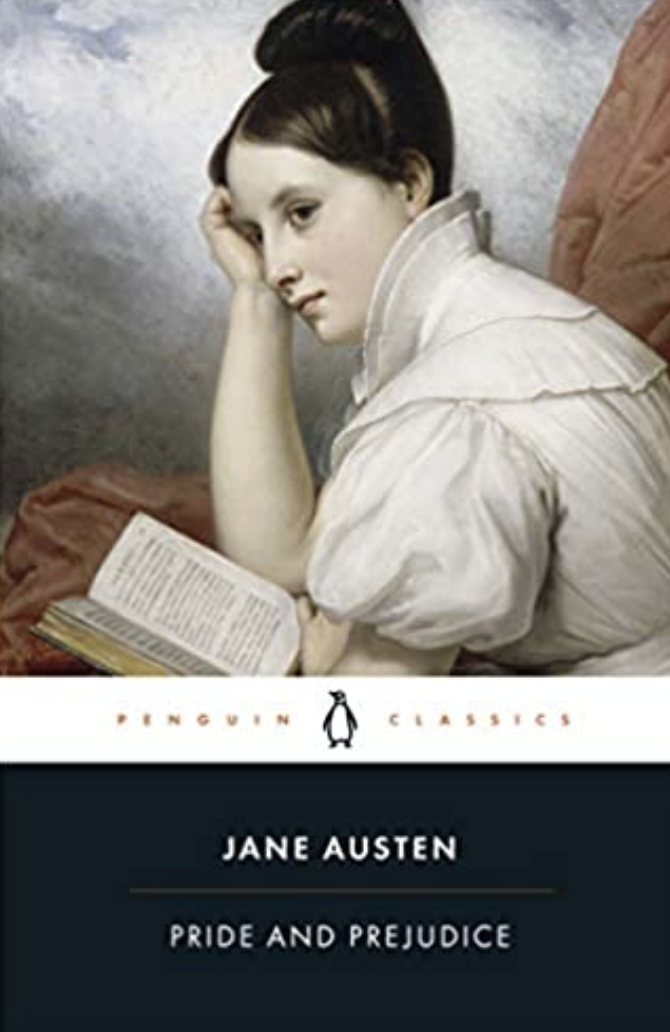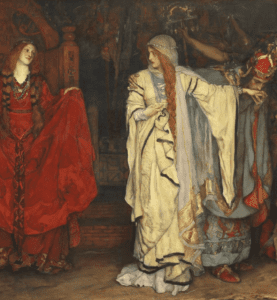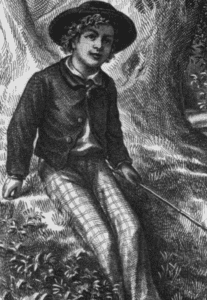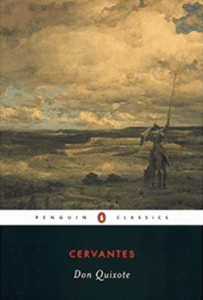Author: Jane Austen, an English novelist of the late eighteenth century.
Published anonymously in early nineteenth century England, Austen’s second novel is different from contemporary didactic and moralizing writing, describing ordinary concerns of middle-class people. The famous opening lines claim as a universal truth that a gentleman with fortune must be looking for a wife. The novel portrays the reverse, as in Austen’s England, women without fortune desperately looked for husbands.
Young affluent Bingley rents spacious Netherfield Park, and Mrs. Bennet of neighboring modest Longbourne determines to marry one of her five daughters to Bingley. Good-looking with an unaffected easy manner, Bingley is unlike his snobbish sisters Caroline Bingley and Louisa Hurst, and Louisa’s dull husband. Young, tall, handsome, and wealthy Darcy, Bingley’s friend, soon disgusts everyone with his haughty demeanor.
At a ball, protagonist Elizabeth Bennet sits for a few dances due to the scarcity of gentlemen. Darcy stands alone having declined introduction to any lady, remarking to Bingley he is dancing with the only beautiful girl – Elizabeth’s elder sister Jane, and Darcy would not give consequence to a girl slighted by other men, indicating Elizabeth.
High-spirited Elizabeth of twenty, with a lively playful disposition delighting in anything ridiculous, is amused overhearing this. Darcy’s initial opinion that Elizabeth is tolerable, but not handsome enough to tempt him, soon changes. At one ball, Darcy asks Elizabeth for a dance and Elizabeth playfully but firmly declines, rising in his esteem. Darcy is smitten with Elizabeth, to whom he is just a proud and rude man.
Bingley becomes fond of serene and angelic Jane, his sisters pretending to be so, guileless Jane taking them at face value. Elizabeth’s mother forces Jane to ride to Netherfield when rain is expected, her wish that Jane is caught in rain and recovers from cold at Netherfield coming true. Learning of Jane in discomfort, Elizabeth braves muddy fields to comfort her. Darcy admires Elizabeth even more at this, though the Bingley sisters laugh at Elizabeth’s mud-spattered garments.
Longbourne being entailed only to male heirs would go to Collins, clergyman cousin of Elizabeth’s father. Pompous, self-important, garrulous Collins intends to atone for this by marrying a Bennet sister. Mrs. Bennet warns Jane is taken, and Collins woos Elizabeth unsuccessfully. Elizabeth’s friend and neighbor – pragmatic Charlotte of twenty-seven, the eldest of numerous fortune-less siblings, consoles Collins, speedily becoming Mrs. Collins.
Elizabeth’s middle sister – plain and serious Mary, sings and plays music, though having neither talent nor taste. Youngest Lydia, sixteen, followed faithfully by frivolous and silly elder sister Catherine, flirts with dashing officers in regimentals stationed at nearby Meryton, where Mrs. Bennet’s sister Aunt Philips lives. Elizabeth observes charming new recruit Wickham’s cold salutation to Darcy on a chance meeting.
Wickham confides Darcy’s father wished a family rectory to go to Wickham, his steward’s son and a particular favorite. Darcy ignored his wishes after his death, thus depriving Wickham of a living. Elizabeth cannot disbelieve gallant Wickham, particularly since Darcy confessed to having a resentful and unforgiving temper. Wickham is absent at Netherfield ball, though invited.
Bingleys decamp, Caroline writes to Jane they will not return soon, and Bingley would marry Darcy’s sister Georgina. After months of waiting, Jane goes to London with Mrs. Bennet’s brother Gardiner and his wife. Caroline is dismissive when Jane visits her, and Bingley never calls on Jane. Elizabeth accompanies Charlotte’s father and sister to stay a few weeks at Collins’ rectory besides Rosings, the estate of Lady Catherine de Bourgh, Collins’ patron and Darcy’s aunt.
Collins constantly praises the generosity and ‘condescension’ of Lady Catherine, whom Elizabeth finds insufferably arrogant. According to Wickham, her sickly daughter is intended for Darcy, but Darcy ignores her visit with cousin Colonel Fitzwilliam. Colonel reveals Darcy prevented Bingley’s unsuitable alliance, unaware it is with Elizabeth’s sister. Distressed Elizabeth stays back when others visit Rosings, and Darcy calls on her.
Darcy professes his love for Elizabeth, having resisted long due to Elizabeth’s low connections. Furious Elizabeth accuses him of ruining Jane’s and Wickham’s lives. Darcy feels she would have accepted if he did not denounce her relations, but Elizabeth says she would never marry one so conceited. The next morning, Darcy clarifies his motives in a letter.
Wickham refused the living, taking money instead and squandering it in debauchery, later seeking it again. To avenge Darcy’s refusal, Wickham planned to elope with Georgina, then only fifteen. Darcy mistook unruffled and unexpressive Jane as indifferent to Bingley. Darcy’s objection to Elizabeth’s family is a lack of propriety, rather than class. Elizabeth understands she was mistaken in her judgment.
Bennet grants Lydia permission to accept a Colonel’s wife’s invitation to Brighton where the regiment has moved, disregarding Elizabeth’s misgivings. The Gardiners take Elizabeth on a trip, traveling to Aunt Gardiner’s village near Darcy’s estate Pemberley. Darcy’s family reportedly being absent, they visit the estate and hear the servants praise their kind master. Darcy arrives unexpectedly, and after the initial awkwardness, behaves like a true gentleman, surprising everyone. When Georgina and the Bingleys arrive the next day, Elizabeth realizes Georgina is sweet and shy unlike what Wickham represented. Bingley inquires after Jane with longing.
Their trip is cut short by Jane’s letter that Lydia has eloped with Wickham, which Darcy hears. The Bennets are devastated and the marriage prospects of the other sisters are seemingly ruined, especially as Wickham is unlikely to marry penniless Lydia. Gardiner searches for weeks, finally writing to Bennet that Wickham agrees to the marriage with an astonishingly paltry annual allowance, demystified when brazen Lydia visits with her husband, inadvertently admitting to seeing Darcy. Elizabeth confirms from Aunt Gardiner that Darcy tracked Wickham down, and paid off Wickham’s debts which made him run, buying him a commission in a distant county.
Bingley and Darcy return to Netherfield to shoot birds, Bingley proposing to Jane with Darcy’s approval. Hearing Bingley was unaware of Jane’s stay in London, Jane accepts. Lady Catherine visits Longbourne and aggressively demands that Elizabeth relinquishes Darcy to her daughter, Elizabeth’s spirited retorts infuriating her. Her meddling has the opposite effect of encouraging Darcy to propose anew, and Elizabeth accepts with gratitude and love.




